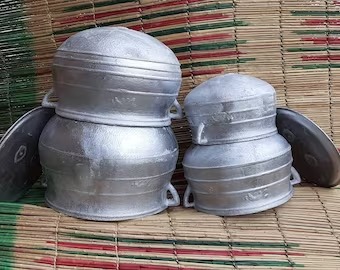A new study on nearly 200 consumer products and food samples across four regions in Ghana has revealed worrying levels of lead contamination in the popular metal cookware, 'dades3n'.
The Global Rapid Market screening study which happens to be the largest of its kind highlights alarming levels of lead in consumer goods and food produced in low and middle-income countries including Ghana with far-reaching global consequences.
The study conducted by the environmental NGO, Pure Earth’s Blacksmith Initiative revealed that there are high levels of lead contamination in the following: Metal cookware (Dades3n) is 55%, ceramic cookware has 18%, toys for kids has 14%, and cosmetics (local mascara) has 7% of lead.
According to a report launched by the World Bank recently, the levels of lead exposure are extremely high which leads to a decrease in IQ.
“Children under 5 years old worldwide lost 765 million IQ points, those living in low and middle-income countries lost 729 million IQ points.”
“There is an average loss of 5.9 IQ points per child and this IQ points loss is 80% greater than the previous estimate,” the report stated.
Country Director for Pure Earth, Esmond Wisdom Quansah also reiterated that eating from these metallic cookwares puts individuals at a high risk of lead poisoning.
According to him, the experiment was conducted six times and the results were the same hence the institution wants to create public awareness so that other alternatives may be considered to avoid further damage.

“What this points to is that we are not safe, if you happen to be eating from any of these metallic or ‘dades3n’ cookware we are at risk of lead poisoning.”
“We’ve grown a step further, our scientists have conducted what we call the leach test to determine the percentage of leach of this lead concentration in this metallic or aluminium cooking pot into the food and we were surprised by the findings of the scientists.”
"52% of the pots tested leached lead in concentrations greater than our reference level of 10 ug/L. The repeated leaching “boils” in pots in general resulted in lower lead in leachate, although lead remained above the 10 ug/L reference level in most cases, so that is a cause for concern for everyone and that is why we are putting this information in the public,” he explained.
Latest Stories
-
EC asks police to start criminal investigation into Ejisu by-election ‘white envelope’ bribery allegation
36 mins -
LPG Marketers Association kicks against NPA’s $80 per metric ton levy on LPG
1 hour -
We need a comprehensive review of Ghana’s financial regulations – Dr Alhassan Andani
1 hour -
Court dismisses injunction against NBA for approving registration of 14 new GM crops
1 hour -
Penalty for companies not filing returns increased to GH¢1k from May 1
2 hours -
Ejisu By-Election: Results so far
2 hours -
Ejisu By-Election: And the winner is…
2 hours -
Dumsor: Businesses could collapse if situation is not resolved – Ghali
3 hours -
Ejisu by-election: NPP will do everything possible to win – Kingsley Nyarko
3 hours -
‘White envelope’ incident was unfortunate – Political Science lecturer
3 hours -
NPP will always win Ejisu elections – Paul Yandoh
3 hours -
Manhyia Palace Museum comes alive in May by showcasing restored Asante treasures
3 hours -
NPP win in Ejisu by-election will signal Bawumia’s triumphant victory in 2024 polls – Richard Ahiagbah
3 hours -
Presidents must respect Chiefs, says historian
3 hours -
Deloitte 2024 Technology, Media and Telecom predictions: Experts upbeat about impact of economy
3 hours

